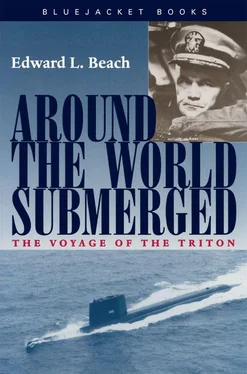Fortunately, an immediate decision on this, too, could be postponed for a little while. At the moment, Triton was proceeding over a particularly deep section of the South Atlantic, and for some hours the fathometer had been showing a relatively flat, level bottom. There would be small chance of sudden peaks, since the topography of the bottom indicated that the granite substructure required for such peaks was most likely not present. In a couple of days, however, we would pass into more shallow areas. There, the structure of the earth could very likely be composed of stone outcroppings of one sort or another, and we would need that fathometer desperately.
In the control room, Chief Sonarman George McDaniel, assisted by Sonarmen First Class Beckhaus and Kenneth (“Shorty”) Remillard, had already removed the cover from the fathometer console, and they were taking electrical measurements of the electronic equipment inside. The space where they had to work also happened to be the Diving Officer’s watch station. And Lieutenant George Sawyer, whose watch this was, appeared to be having a little difficulty staying out of their way.
One deck below and one compartment aft, in the air-control center, where the data supplied by Triton’ s radars is plotted and evaluated, Electronics Technicians Gordon Simpson and Martin Docker were huddled with their division officer, Lieutenant Milton R. (“Whitey”) Rubb, over the manufacturer’s instruction book for the fathometer.
It was apparent that all these men, at least, fully shared my appreciation that our fathometer needed to be put back in commission quickly.
In the crew’s berthing compartment, just forward of the control room, I came upon Poole. In spite of Jim Stark’s warning, I was unprepared for what I saw, and was instantly shocked into concern.
Eyes half-closed, face swollen, Poole had risen to his forearms and knees and was quivering with obviously excruciating pains.
It so happened that he had one of the higher bunks in the ship, normally reached by a portable aluminum ladder. The ladder had been placed against the side of his bunk, and First Class Hospitalman Richard Fickel stood upon it in such a manner that if Poole, in one of his uncontrolled movements, were to fall out of his bunk, Fickel would be in a position to catch him or at least restrain him and break his fall.
One or two off-watch personnel, who occupied the same bunking area as Poole, looked uncomfortably at me. The message in their eyes was unmistakable, though they knew that everything possible was being done for him. “Can’t we do something to make it easier for him?” they appeared to ask. One thing I did know—though this did not seem the appropriate time to mention it—Jim Stark had explained that despite his painful writhings and muffled groans, Poole was in fact not fully conscious. Later on, he would remember nothing at all about his sufferings. The morphine would take care of that.
Abruptly, I turned about and went back to the wardroom. There, ignoring the troubled gaze of two or three of the ship’s officers, I silently drew a cup of black coffee and retired to my stateroom. There were a number of things I needed to think out.
Taking the easier one first—casualties to fathometers were rare. I had never heard of one going out of commission before. Fathometers are, after all, not extremely complicated pieces of equipment, and the Navy has been using them for many years. By this time, surely, they should have been perfected, made proof against all the ordinary hazards of shipboard service. Perhaps there was something about ours that was improperly hooked up, perhaps some part in this particular fathometer was a little extra fragile—just enough to cause the trouble. In that case, we’d find it. But the worrisome thing was Dick’s report that the fathometer head was slowly losing sensitivity. Was anything actually happening in the fathometer head? If this were so, there would be nothing we could do about it.
The fathometer lay up in the bows of the ship, adjacent to the keel; the only way it could be reached was by dry-docking the entire ship. In earlier submarines, perhaps with this very casualty in mind, the fathometer had been located in the forward trim tank, where it was accessible. Would that this were true in Triton! Without a fathometer, the hazards of our trip would be infinitely increased. What to do if it proved impossible to repair?
One thing seemed to be clear. The importance of our voyage, the responsibility which the Navy had placed on us to complete it—for its stated and unstated purposes—justified every reasonable effort to continue. Serious though the loss of the fathometer might be, if this were our only debility, we could and would keep on. Will Adams, I knew, could be depended on to take all reasonable and possible precautions to compensate for the lack of this vitally important navigation aid.
Poole’s problem was considerably more difficult, and I had much less experience to guide me. Jim Stark’s medical book detailed the treatment for a kidney stone, which involves an extremely complicated operation, and I found myself reading the book quite carefully in order to understand the problem. I read and reread the description of what would happen in the event proper treatment could not be given. As Stark had already said, there would be a backing up of the normal flow; swelling of the tiny ureter tubes; dreadful pain, less and less controllable by opiates; serious illness, possibly involving both kidneys; ultimately, permanent injury to the kidneys; possibly death.
Unlike most complaints, however, kidney stones can suddenly and dramatically cease to be troublesome. If Poole passed the stone, and there were no others, he might well make a complete recovery in a few hours. This, Jim had assured me, was the normal experience. Or, should the stone not pass, it might not create a complete blockage. If this were the case, Poole might become a sort of arrested case which could be “held”—Jim’s expression—under careful surveillance until our return home.
A third possibility was that there was not one but a number of stones, any one of which could hang up in an already irritated and inflamed urinary passage. A “remission” could occur, after which Poole might well experience more attacks. There was no possible way, short of X-raying him, to find this out.
Fourth was the possibility that a complete and permanent blockage had already occurred; that Poole was fated to become progressively worse until he received proper medical attention.
With a sigh, I recognized that this problem was entirely out of our hands. It was a question of whether Poole got better or worse.
But suppose Poole recovered for a day or two, or even for weeks, and then had another attack? Suppose by then we were well out into the Pacific? What would we do then? Where could we take him, how get him the medical help he needed? On the other side of South America there was Chile, with its lovely port city of Valparaiso, where surely there was competent medical care to be found. Farther along our route—many thousands of miles farther—lay Pearl Harbor in the Hawaiian Islands. Here, we would be among friends and be able to get all the assistance necessary.
But either Valparaiso or Pearl Harbor would be well out of our way, far enough to cost us many days of travel.
In the meantime, we were passing two of the largest cities in South America, Montevideo and Buenos Aires, both bordering on that enormous Rio de la Plata which Magellan had first joyously assumed to be the long-sought south passage to the Pacific. Entering Montevideo, Buenos Aires, or Valparaiso would all be about one and the same, so far as the effect on our intended submerged circumnavigation. But the USS Macon was scheduled to visit Montevideo in a few days. This was an important consideration. On this side of South America, help from the US Navy could best be received from the Macon. On the far side, we would have to wait to reach Pearl Harbor, a matter of about three weeks.
Читать дальше












